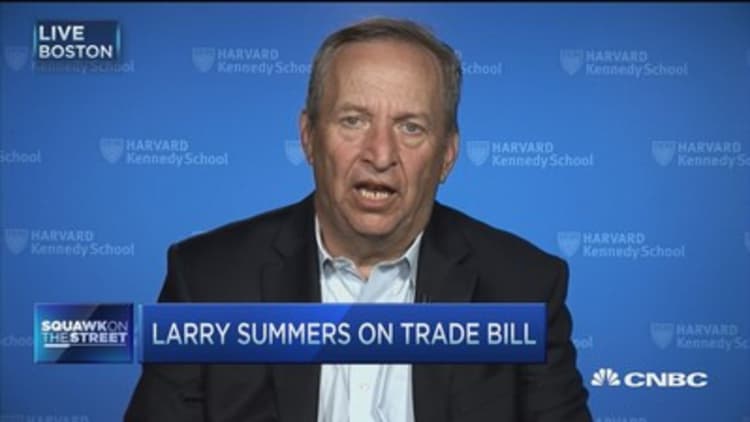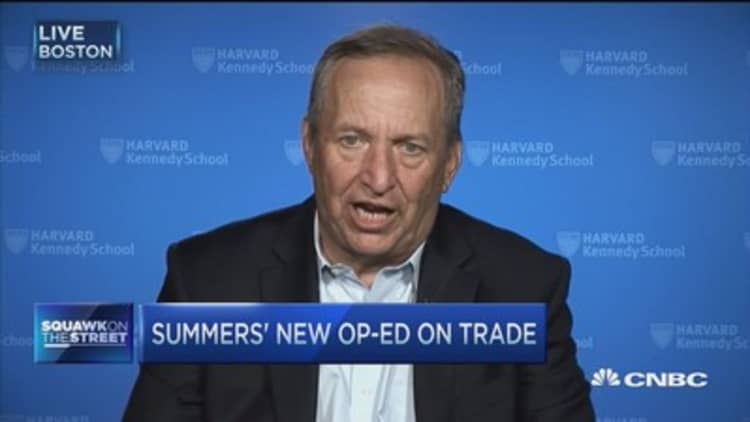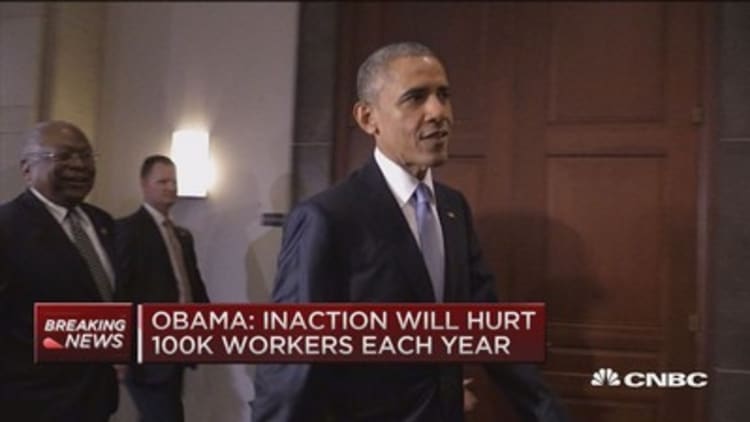


Failure to move forward in Congress on a 12-nation trade deal spearheaded by the United States will raise questions about American leadership and hurt the country's geopolitical standing, former U.S. Treasury Secretary Larry Summers said Monday.
"It will be a more dangerous world if the United States shows itself again unable to participate in international organizations in a full way and unwilling to support global trade agreements that it initiated," the former economic advisor to President Barack Obama told CNBC's "Squawk on the Street."
He said the United States has already failed to participate in China's Asian Infrastructure Investment Bank, which other Western economic powers have joined. It has also been unable to deliver support for increased Asian participation in the International Monetary Fund and held back the World Bank from growing, he added.
"If we want to be relied upon, if we want people to be interested in our initiatives, if we want to remain a substantial and trusted presence in Asia, a negotiation that we launched three years ago and that we've driven has to be a negotiation that the United States can carry through on."
Read MoreGOP hopeful Huckabee: My beliefs won't trip me up
Summers first laid out his argument in a weekend editorial in the Financial Times after the House of Representatives rejected a measure necessary to give Obama authority to "fast track" trade negotiations. That authority would allow the president to move forward on the Trans-Pacific Partnership, a free trade deal among a dozen Pacific Rim nations.
House Democrats were instrumental in defeating the measure, known as Trade Adjustment Assistance, which provides aid to U.S. workers who lose their jobs as a result of foreign trade. While Democrats support the program, they oppose major parts of the Trans-Pacific Partnership, which faces opposition from labor unions.
Summers said one can debate the economics of the trade deal, but the importance of the United States being seen to be able to follow through is unquestionable.
"If the United States is not able to carry through, that will raise questions about the capacity for presidential leadership both for the remainder of this presidential term and going forward," he said. "No other country in the world wants to be in the position of negotiating first with the president, and then with a Congress whose behavior can't be predicted."
The fast-track power known as Trade Promotion Authority, allows the executive branch alone to negotiate the terms of trade deals. Congress would only be able to vote for or against the final deal, rather than becoming actively involved in negotiations with foreign countries.
Summers said it is legitimate to raise concerns that the Trans-Pacific Partnership will not boost American workers or protect human rights overseas, but said refusing to grant Trade Promotion Authority will only assure a deal will not get done.
Read More
Asked why Obama has not been able to get labor groups on board, Summers said the United States has not done what it needs to do as a country to help working people get by. Labor is wary of foreign trade because the right to organize and basic social protections are diminished, income inequality is on the rise, and job growth has been held back by lack of infrastructure investment, he said.
"There is every reason for organized labor to be unhappy," Summers said. "The problem is that this is the wrong hostage for them to take."
Global trade will increase with or without the Trans-Pacific Partnership, and defeating the deal is not a strategy that will protect the middle class, he said. Instead, labor should focus on increasing the minimum wage, expanding family leave, improving universal health care and making higher education more affordable, he said.


